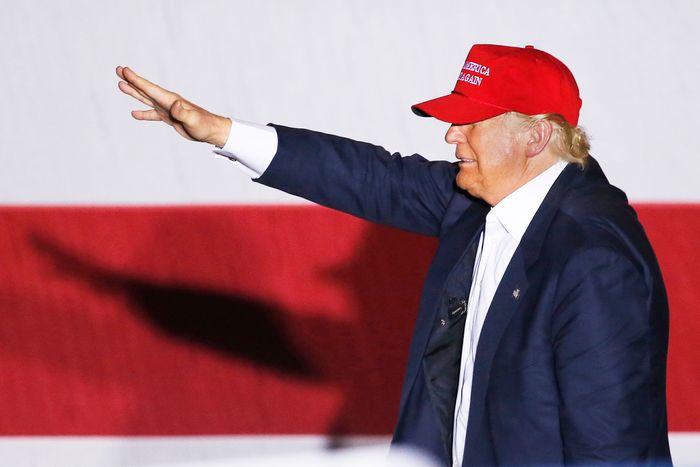By Ray Williams
November 30, 2020
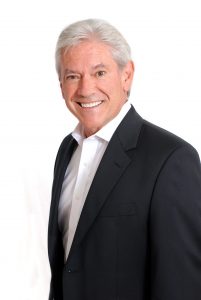
Part 2 of the Article: Are Americans Becoming More Authoritarian Under An Autocratic President?
Many observers have argued that America was slipping into an autocratic state under President Trump, and his current efforts to undermine the results of the Presidential election that Joe Biden won is an attempt to stage a coup, straight out of the dictator’s handbook. and the signs are clear. Itt’s time that people should not only take notice, but also speak out, because the implications affect the world. History has shown us that democracies can easily slide into becoming authoritarian states.
Even if Trump is unsuccessful in his efforts to hold onto power, many observers have indicated that he will continue to exert his control over the Republican party, including a plan to run for the 2024 Presidential election. And he has a large supportive citizenry which will be courted and manipulated through his powerful media apparatuses.
In a recent article in The Atlantic, “Why Do Republican Leaders Continue to Enable Trump?” Anne Applebaum , former editor at The Economist and The Spectator, and was a member of the editorial board of The Washington Post, writes:”In practice, Trump has governed according to a set of principles very different from those articulated by his original intellectual supporters. Although some of his speeches have continued to use that populist language, he has built a Cabinet and an administration that serve neither the public nor his voters but rather his own psychological needs and the interests of his own friends on Wall Street and in business and, of course, his own family. His tax cuts disproportionately benefitted the wealthy, not the working class. His shallow economic boom, engineered to ensure his reelection, was made possible by a vast budget deficit, on a scale Republicans once claimed to abhor, an enormous burden for future generations…”
“He worked to dismantle the existing health-care system without offering anything better, as he’d promised to do, so that the number of uninsured people rose. All the while he fanned and encouraged xenophobia and racism, both because he found them politically useful and because they are part of his personal worldview. More important, he has governed in defiance—and in ignorance—of the American Constitution, notably declaring, well into his third year in once, that he had “total” authority over the states. His administration is not merely corrupt, it is also hostile to checks, balances, and the rule of law. He has built a proto-authoritarian personality cult, ring or sidelining officials who have contradicted him with facts and evidence—with tragic consequences for public health and the economy…”
“Politicians here who have spent their lives following rules and watching their words, calibrating their language, giving pious speeches about morality and governance, may feel a sneaking admiration for someone like Trump, who breaks all the rules and gets away with it. If there is no such thing as moral and immoral, then everyone is implicitly released from the need to obey any rules. Far too many Trump collaborators say to themselves ‘If the president doesn’t respect the Constitution, then why should I? If the president can cheat in elections, then why can’t I? If the president can sleep with porn stars, then why shouldn’t I?'”
Burt Neuborne, the Norman Dorsen Professor of Civil Liberties and founding legal director of NYU School of Law’s Brennan Center for Justice and has participated in more than two hundred cases in the U.S. Supreme Court. Neuborne is the author the book When at Times the Mob Is Swayed: A Citizen’s Guide to Defending Our Republic, sounds the alarm bells by drawing a parallel between Trump and Hitler. He says, “But I can’t ignore the fact that Trump’s savagely divisive political rhetoric, both as a candidate and as our 45th President, closely tracks the tropes that Adolf Hitler used from 1932-36 to persuade a critical mass of the German people to trade their democratic birthright for a Nazi pottage of xenophobia, bigotry, and scapegoats. Hitler did not take power by force…”
“Germany dropped into his maw like a piece of overripe fruit spoiled by years of poisonous, corrosive rhetoric. The real risk to American democracy posed by Trump’s talent for invective and divisiveness is not a military putsch. It is the erosion of the bonds of mutual respect and common decency that hold constitutional democracies together. One key to Hitler’s success in talking German democracy to death can be found in the Holocaust Museum in Jerusalem, where two small green plastic cubes rest almost unnoticed on small display tables—surviving examples of the miniature radios distributed free of charge by the Nazi Party in the years following 1932.”
“There was only one catch: the free radios received only a single frequency—the unremitting, unadulterated voice of Adolf Hitler spewing his witches’ brew of bigotry and hate directly into the heads of 35-40% of the German people. Trump’s mastery of Twitter is the twenty-first century analogue of those green plastic radios, forging a direct line of unfiltered communication with 40 million Americans, enabling Trump to stoke mass fears and foment divisive anger on demand.”
Neurone goes on to compare Hitler’s speeches and rhetoric to Trump’s: “Hitler promised to return Germany to pre-WW I greatness, railing against a shadowy international order dedicated to keeping Germany in chains. Trump promises to make America great again, railing against a shadowy international order dedicated to fleecing America. Hitler pulled Germany from the League of Nations. Trump has already pulled the United States from multilateral treaties and threatens to pull us from NATO…”
“Both Trump and Hitler waged war on the idea of objective truth, relentlessly disseminating a pastiche of lies and half-truths designed to persuade a populist jury of the Leader’s distorted version of reality. Hitler coined the term “lugenpresse” (lying press) to castigate the mainstream newspapers bent on exposing his lies. Trump insists that he is the target of ‘fake news’ invented by a lying mainstream press. Hitler derided scientific experts who disagreed with his crackpot racial and economic theories. Trump attacks climate scientists and economists who disagree with his policies.
“Both Hitler and Trump excelled at scapegoating. Hitler’s poisonous rants blamed Jews, Roma, and the ‘elites’ for Germany’s problems. Trump blames Muslims, undocumented immigrants from Central America, and ‘the elites’ for America’s problems…”
“Hitler hardened Germany’s border, restricting travel to and from the country, and engaging in trade wars designed to benefit German industry. Trump bans Muslims, wants to build a wall on the Southern border, and has initiated trade wars with China, India, Europe, Canada, and Mexico. Hitler used the pretext of the Reichstag fire in 1933 to declare a ‘national emergency’ justifying the exercise of unilateral Executive power. Trump has used multiple declarations of non-existent national emergencies to ignore Congress.”
The Use of Government To Perpetrate Violence on Citizens
We are all familiar with Trump encouraging violence towards protestors at his rallies, and encouragement of police to get “tough” with and dominate suspects and demonstrators. And of course, his direction to use excessive force and violence including by unmarked “paramilitary or mercenary” forces to quell a peaceful Washington D.C. demonstration. This added to his comments about White Nationalists and Neo-Nazis as being “good people” emphasizes his willingness to use government security forces and violence to serve his ends.
Violence on the streets is a particular characteristic of fascism and Nazism, after World War I had really got people used to violence and military bands roaming the street beating up their opponents. That is obviously not happening in America today. I think anyone who wanted to destroy America, American democracy, and American institutions is going to use the power of the state to do so.
The Miscalculation of Trump’s and Hitler’s Character
Many people thought that Hitler was a buffoon. He was a joke. He wasn’t taken seriously. Alternatively, they thought that he could calm down when he assumed the responsibilities of office. That was a very common belief about Hitler. There is a major difference in the sense that Trump speaks off the cuff in a very unguarded, spontaneous way. I think that’s true with his tweets. Hitler very carefully prepared all his speeches. They might seem spontaneous, but they were carefully prepared.
When the character of Hitler and Trump are compared, the issue of rationality comes up .What that means is just really not adhering to the conventions of normal political life. That’s something that Hitler did. He did not rule, for example, through a Cabinet. He didn’t use the accepted institutions of government. He had a clique of people around him, Goebbels, Hermann Göring, and so on: a whole group of top Nazis who were his cheerleaders, really. They’re the ones who do the work.
Within just a few years, the Cabinet didn’t meet at all. It’s just a very informal way of ruling that of course leads to a lot of chaos, because competencies are not clearly defined and there are a lot of rivalries within Hitler’s group of leading Nazis that prove often counterproductive.
It’s interesting there again to see how the civil service, that’s the administration at every level, really, did not provide a very serious resistance to the orders that came down from above.But Hitler did bring everything back to himself. His standard speech begins with his own partly fabricated life story, where he basically was poor, and he was different. He got his identity in the war fighting for Germany. Germany instead collapsed. He rebuilt Germany and so on. It does go back to himself.
When you look at his rambling and incoherent table talk, which was recorded during the war at lunchtime and dinner times by his entourage or written down, there again it’s quite narcissistic. He’s constantly talking about himself, or he’s laying down the law about all kinds of subjects of one sort or another.
In the book Hitler’s Thirty Days to Power, by the historian Henry Ashby Turner, he describes the political machinations that allowed Hitler to seize the chancellorship of Germany. In January 1933, the Nazi party’s vote share had begun to decline, and its party was undergoing a serious internal crisis, with dues falling, members drifting off, and other leaders questioning Hitler’s direction. A widely shared belief across the political spectrum at the time held that Hitler would not and could not win the chancellorship, because Germany’s revered conservative president, Paul von Hindenburg, had long vowed to deny such a position to Hitler.
Hindenburg and the German right viewed Hitler in strikingly similar terms to how Republican elites view Trump. Yes, they badly underestimated his fanaticism, which Hitler had downplayed in public. While they failed to anticipate that Hitler would launch a total war and industrial-scale genocide, they did consider him a buffoon. His appeal, the German elite believed, came from his outsider status, which allowed him to posture against the political system and make extravagant promises to his followers that would never be tested against reality. What’s more, Hitler’s explicit contempt for democracy made even the authoritarian German right nervous about entrusting him with power.
That reality is stark. Trump’s admiration for ironfisted dictators in Russia, China, and North Korea, is the ideological lodestar of his long history of political musings. Over the years, Trump has weaved left and right on health care, abortion, taxes, and even the issues currently central to his campaign, like immigration and trade, but has never wavered from his foundational belief that strong leaders are those who crush their enemies without restraint. Whatever norms or bounds that we think limit the damage a president could inflict are likely to be exceeded if that president is Trump.
Benjamin Carter Hett, professor of history at Hunter College and the City University of New York and author of the new book The Death of Democracy: Hitler’s Rise to Power and the Downfall of the Weimar Republic, argues the following: “Poor economic conditions would not have brought Hitler into power if it had not been for a number of very powerful people in high positions in government and in business. They looked around and said, basically, ‘This guy Hitler is kind of crude and he’s kind of rough — but we can use him.’ It was elite accommodation that allowed Hitler to get through the doors of power.
You could draw a kind of rough and ready analogy from that to how mainstream Republicans have found themselves either wanting Trump or feeling compelled to adopt Trump and his base as a means of keeping themselves in power…
“There is another aspect that is also a striking parallel. The Nazis were very much involved with cultivating deliberate lies for political purposes. In a way I think you could say the Nazis were the inventors of “’are news’ as a political tool. Trump had strong support from white voters across the socioeconomic spectrum. This is comparable to how Christian Germans felt about Jews in the 1920s or 1930s. This is a kind of resentment of the minority which can be mobilized as political passion. That is never going to lead anywhere good. It obviously led somewhere spectacularly bad in Germany in that era. It’s not going to lead anywhere good for us.”
In an essay at the Atlantic, George Packer describes this ominous and pitiful moment in which America under Donald Trump appears more like a failed state than a great nation.
Trump’s 2020 re-election campaign sent an email to supporters that referred to a “Trump Army,” which should not entirely be understood as a metaphor. “The President wants YOU and every other member of our exclusive Trump Army to have something to identify yourselves with, and to let everyone know that YOU are the President’s first line of defense when it comes to fighting off the Liberal MOB.”
Dr. Lance Dodes, a retired assistant clinical professor of psychiatry at Harvard Medical School and now a training and supervising analyst emeritus at the Boston Psychoanalytic Society and Institute has warned that Donald Trump is a sociopath (defined as psychopathic personality type) who will do anything to stay in power. Dodes also spoke about Trump’s use of the term “dominate,” and what it tells us about his desire to control the American people, the country’s elected officials, the military and other institutions of power by any means necessary. Dodes also issued an ominous warning about Trump’s character and behavior, warning that our president is a moral weakling, coward and bully who will continue to lash out at any and all people who he feels have wronged or disrespected him.
Trump’s ultimate desire, Dodes says, is to put his boot on the neck of everyone on the planet.
The Slippery Slope from an Authoritarian/Autocratic State to a Fascist One
The main problem people have in understanding Fascism is that they confuse it with Nazism. They have heard that Hitler was a fascist and so America can never be like that.
Madeleine Albright, a highly respected historian by education who served as the US secretary of state from 1997 to 2001, published an op-ed in the New York Times titled, “Will we stop Trump before it’s too late?” and recently published her new book Fascism: A Warning. The book is the work of a woman who knows authoritarianism when she sees it. And she sees the seeds of it in leaders who have aimed to subvert democratic norms— Turkey’s Erdoğan, Venezuela’s Maduro, Hungary’s Orbán, and others—but also in Donald Trump, whom she calls in the book ‘the first antidemocratic president in modern U.S. history.’”
A widely accepted definition of fascism and fascist governments has been a complicated and highly disputed subject. The exact nature of fascism and its core tenets has been debated amongst historians, political scientists, and other scholars since Benito Mussolini first used the term in 1915. A significant number of scholars agree that a “fascist regime” is foremost an authoritarian form of government, although not all authoritarian regimes are fascist.
Authoritarianism is thus a defining characteristic, but most scholars will say that more distinguishing traits are needed to make an authoritarian regime fascist. Similarly, fascism as an ideology is also hard to define. Originally, it referred to a totalitarian political movement linked with corporatism which existed in Italy from 1922 to 1943 under the leadership of Benito Mussolini. Many scholars use the word “fascism” without capitalization in a more general sense, to refer to an ideology (or group of ideologies) which was influential in many countries at many different times.
For this purpose, they have sought to identify what Roger Griffin professor of modern history and political theorist at Oxford Brookes University, England, calls a “fascist minimum”—that is, the minimum conditions that a certain political movement must meet in order to be considered “fascist”.
According to most scholars of fascism, there are both left and right influences on fascism as a social movement, and fascism, especially once in power, has historically attacked both left, moderate right wing and the opposition in the radical right in order to maintain power.
Facism
“Many of Hitler’s opponents did initially dismiss him as a buffoon. But one year into power? They either were dead, in concentration camps or funning for their lives.”—Richard Evans, The Coming of the Third Reich.
“Experience shows us that every man invested with power is apt to abuse it, and to carry his authority as far as it will go.”—Montesquieu,1748.
“Where you have a concentration of power in a few hands—all too frequently—men with the mentality of gangsters get control.”—Lord Acton,1866.
“The totalitarian mass leaders based their propaganda on the correct psychological assumption that, under such conditions, one could make people believe the most fantastic statements one day, and trust if the next day they were given irrefutable proof of their falsehood, they would take refuge in cynicism; instead of deserting the leaders who had lied to them, they would protest that they had known all along the statement was a lie and would admire the leaders for their superior tactical cleverness.”—Hannah Arendt, in The Origins of Totalitarianism.
“If this [U.S.] government every became a tyrant, if a dictator ever took charge in this country, the technological capacity that the intelligence community has given the government cold enable it to impose total tyranny, and there would be no way to fight back because the most careful effort to combine together in resistance to the government, no matter how privately it was done, is within the reach of the government to know.”—Frank Church, American lawyer and U.S. Senator, chairman of the Church Senate Committee in an interview on the TV program “Meet the Press, ” 1975.
“When Facism comes to America, it will be wrapped in the flage and carrying the cross.”—Sinclair Lewis,American author of the book, It Can’t Happen Here, a novel bout the election of a fascist to the American presidency.
The Fundamental Characteristics of Fascism:
- Right wing conservative orientation. Fascists are fervently against Marxism, Socialism, Anarchism, Communism, Environmentalism, etc.—in essence they are against the progress left in total, including moderate leftists such as social democrats. Fascism is an extreme right wing ideology, although it can be opportunistic.
- Nationalistic: Fascism places a very strong emphasis on patriotism and nationalism. Criticism of the nation’s main ideals, especially war, is lambasted as unpatriotic at best, and treason at worst. State propaganda consistently broadcasts threats of attack, while justifying pre-emptive war. Fascism invariably seeks to instill in its people the warrior mentality: to always be vigilant, wary of strangers and suspicious of foreigners.
- Hierarchical: Fascist society is ruled by a “righteous” leader, who is supported by an elite secret vanguard of capitalists. Hierarchy is prevalent throughout all aspects of society – every street, every workplace, every school, will have its local Hitler, part police informer, part bureaucrat – and society is prepared for war at all times. The absolute power of the social hierarchy prevails over everything, and thus a totalitarian society is formed. Representative government is acceptable only if it can be controlled and regulated, direct democracy (e.g. Communism) is the greatest of all crimes. Any who oppose the social hierarchy of fascism will be imprisoned or executed.
- Anti-equality: Fascism loathes the principles of economic equality and disdains equality between immigrant and citizen.Some forms of fascism extend the fight against equality into other areas: gender, sexual, minority or religious rights, for example.
- Religious: Fascism contains a strong amount of reactionary religious beliefs, harking back to times when religion was believed to be “strict, potent, and pure”. Nearly all Fascist societies are Christian, and are supported by Catholic and Protestant churches.
- Capitalist: Fascism does not require revolution to exist in capitalist society: fascists can be elected into office (though their disdain for elections usually means manipulation of the electoral system).They view parliamentary and congressional systems of government to be inefficient and weak, and will do their best to minimize its power over their policy agenda. Fascism exhibits the worst kind of capitalism where corporate power is absolute, and all vestiges of workers’ rights are destroyed.
- Militaristic: Fascism is capitalism at the stage of impotent imperialism. War can create markets that would not otherwise exist by wreaking massive devastation on a society, which then requires reconstruction! Fascism can thus “liberate” the survivors, provide huge loans to that society so fascist corporations can begin the process of rebuilding.
- “Voluntarist” Ideology: Fascism adopts a certain kind of “voluntarism;” they believe that an act of will, if sufficiently powerful, can make something true. Thus all sorts of ideas about racial inferiority, historical destiny, even physical science, are supported by means of violence, in the belief that they can be made true. It is this sense that Fascism is subjectivist.
- Anti-Modern: Fascism loathes all kinds of modernism, especially creativity in the arts, whether acting as a mirror for life (where it does not conform to the Fascist ideal), or expressing deviant or innovative points of view. Facism is also selectively anti-science, choosing to support science that supports its agenda. Fascism invariably burns books and victimizes artists; artists who do not promote the fascists ideals are seen as “decadent.” Fascism is hostile to broad learning and interest in other cultures, since such pursuits threaten the dominance of fascist myths. The peddling of conspiracy theories is usually substituted for the objective study of history.
Fascism stuns us with fresher and larger outrages, that make yesterday’s seem irrelevant, winnowing away our decency. Fascism makes it more and more costly to be your better self. This shock-and-awe strategy of moral violation was an explicit goal of the Nazis — Hitler called it the Big Lie technique, to every day tell a bigger lie, and yesterday’s would soon be forgotten. It’s also one the Russians use this technique today to first overwhelm us, until we are left numb and paralyzed by the sheer scale and scope of all these transgressions against civilization, wondering which outrage to speak out against first, and thus, we weary of morality itself.
What is its effect? It raises the cost of being your better self. Fascism depends on fear and despair and a return to the past rather than a vision for a better society. People are fearful about what will happen to them, feel disenfranchised or feel like the country no longer cares about them, and want a return to “better times” in the past.
Fascism proceeds through a series of authoritarian collapses, each one a little more severe than the last. A series of actions by the leader(s) occur, sometimes on a daily basis, so that people begin to feel like it’s the norm, or become numb because of the overwhelming stressful impact.
Fascism is just like an epidemic of a lethal virus. Those who follow the leader take their cues from him, and have license to act in the same ways because they know there will be few or no consequences. Behavior becomes viral. Sixty-eight percent of voters polled by two researchers believed the President Trump’s repeated claims that widespread “voter fraud” cost him the popular vote in the 2016 election, and 52 percent said they would support postponing the 2020 election in order to make sure only “legal” citizens cast ballots.
Fifty-six percent answered that they would support the measure if Trump and Congress approved of it. “At a minimum, [the survey results] show that a substantial number of Republicans are amenable to violations of democratic norms that are more flagrant than what is typically proposed,” wrote Ariel Malka and Yphtach Lelkes, in the Washington Post.
Donald Trump, the Autocratic Ruler
Donald Trump was a few steps from becoming an elected dictator.
Trump’s specific policies aren’t the thing that most sets him apart from the rest of the field of GOP candidates. Rather, it’s his rhetoric and style. The way he reduces everything to black-and-white extremes of strong versus weak, greatest versus worst. His simple, direct promises that he can solve problems that other politicians are too weak to manage.
And, perhaps most importantly, his willingness to flout all the conventions of civilized discourse when it comes to the minority groups that authoritarians find so threatening. That’s why it’s a benefit rather than a liability for Trump when he says Mexicans are rapists or speaks gleefully of massacring Muslims with pig-blood-tainted bullets: He is sending a signal to his authoritarian supporters that he won’t let “political correctness” hold him back from attacking the outgroups they fear. Trump has a classic authoritarian leadership style: simple, powerful, and punitive.
There were plenty of signs that show Trump is attempting to make the U.S. into an authoritarian state, and some that frankly have echoes of a fascist nation. Here’s a few:
Systematic attacks on the media. Often referring to the news media (except his news outlet, Fox News) as the “enemy of the people,” and “fake news,” there’s little doubt that Trump and his associates have repeatedly tried to intimidate mainstream media organizations, whether through tweets deriding the supposedly “failing” New York Times, the repeated references to the “Amazon Washington Post,” or White House chief strategist and former Breitbart head Stephen Bannon’s referring to media organizations as “the opposition party.”
Trump and Fox News also falsely accused the Times of thwarting efforts to kill or capture top Islamic State leaders, and the White House has arbitrarily excluded reporters of some organizations from press pools, press conferences, and other events. And in the lead up to the mid-term elections, Trump harangued his audience nonstop about the “criminal and diseased” immigrant caravan that was going to invade the U.S. and attack innocent American citizens. And that’s just a small sample of Trump’s war on the press.
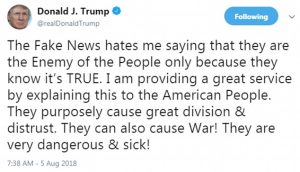
Building an official pro-Trump media network: There’s little doubt Trump has tried to favor outlets that embrace him, which is why the White House gave press credentials to the right-wing blog Gateway Pundit and has given the reliably wacky and pro- Trump Breitbart privileged access. And as one might expect, the Trump administration has backed the expansion plans of the conservative Sinclair Broadcast Group. But Fox News and Sinclair act more like the administration’s publicity firms than independent news organizations.
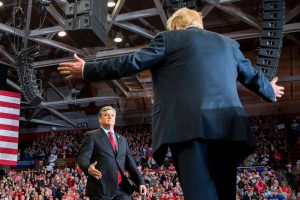
Trump greeting FOX NEWS Sean Hannity at one of Trump’s rallies.
Politicizing the civil service, military, National Guard, or the domestic security agencies.An obvious counterweight to executive overreach are career civil servants who remain sensitive to precedents, have lots of expertise, and tend to follow the rule of law. And as Samuel Huntington, former director of Harvard’s Center for International Affairs and White House Coordinator of Security Planning for the National Security Council under President Jimmy Carter, pointed out many years ago, an important barrier to excessive militarization is having a professional military whose direct political role is limited. Trump has taken steps to politicize the civil service in various ways or turn the military and the intelligence and domestic security agencies, including the Department of Justice into tools of the White House instead of independent defenders of the Constitution.
Trump has demanded that senior officials resign or fired people who declined to do his bidding, such as former Deputy Attorney General Sally Yates and FBI Director James Comey and more recently, independent Inspector Generals. He has declined to make top appointments in a number of agencies, at one point telling Fox News,“A lot of those jobs, I don’t want to appoint, because they’re unnecessary.” Trump has also questioned the integrity of the nonpartisan and highly respected Congressional Budget Office, and recently the CDC and he crossed another line by telling uniformed military personnel to call Congress and lobby for his defence spending and health care proposals.
Enforcing the law for only one side. A systematic crackdown on left-wing opposition has not occurred, but Trump & Co. do not seem at all concerned by the growing level of rightwing extremism in the country and utterly indifferent to such tendencies abroad. Trump has been quick to condemn terrorist attacks by Muslims and the shooting of Rep. Steve Scalise (R-La.) in June but said nothing after a disturbed right-wing sympathizer murdered an innocent black American and also when an Israeli-American teenager issued a series of bizarre threats against Jewish synagogues and community centers, and more recently death threats aimed at Democratic politicians. It is hard to escape the impression that Trump thinks the law is something that applies to other people — and mostly to those who probably didn’t vote for him.
Questioning the validity of the election system unless it’s in his favour. Trump’s current attempt to call the results of the 2020 Presidential election invalid, corrupt and claim that he won is classic dictator strategy. And he is supported by the vast majority of Republican politicians and voters.No serious scholar of U.S. voting behavior believes that electoral fraud is widespread or politically consequential, but Trump, and other Republican politicians would like to make it as hard as possible for people they deem unlikely to vote their way to actually go to the polls. He has even intimated that if he lost the election it would not be legitimate, and that his supporters would need to “do something about it.”
Fear mongering. As he did during the campaign, Trump has continued to issue dark warnings about various dangers from which he supposedly needs to protect us. His inaugural address conjured up a weird, Gothamesque description of “American carnage,” and in a speech in Poland openly asked whether “the West” still had the will to defend itself. He has continued to rail against Muslims (except for the rich ones in Saudi Arabia) and to inflate threats from North Korea and Iran. And he has stoked fear about immigrants.
Witness the fear campaign about the immigrant caravan from central America headed to the U.S. border, composed of as Trump described them, of rapists, murderers, middle eastern terrorists and disease ridden people.
Creating a scapegoats who are intent on destroying America.Trump has targeted immigrants, particularly Hispanics, and non-whites as the “enemy” who threaten American “national security” and safety. This includes the separation of immigrant children from their parents and establishing detention camps for them.
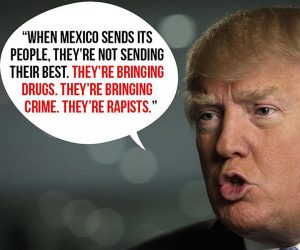
Demonizing anyone who opposes him. No American president has been as prone to treat his opponents with contempt, disregard, and blatant hostility. Trump spent the campaign belittling his Republican opponents and vowing to “lock up” Hillary Clinton. Now he is on a campaign to accuse former President Obama and his administration of “crimes.” He has continued to blame America’s problems on everyone but himself, accuse anyone who opposes him of betraying the country, and offers self-pitying “tweetstorms” about the vast opposition he faces from his supposed enemies (some of whom used to be allies).
He uses the language of “nationalism,” ignoring its connotations in history in Germany, Japan and Italy. In his America first policy, and his withdrawal from international treaties and agreements, his rhetoric and action is both insular and stokes the aggressive attitude in his followers of “us and them,” and the rest of the world being against the U.S.
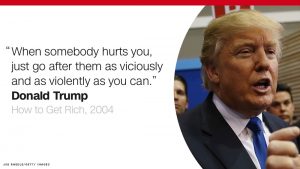
Surrounding himself with sycophants and corrupt people who are blindly loyal and acting out of their own self gain.Trump is unwilling and unable to separate his own personal financial and personal interests (and those of his businesses) from that of the Presidency and the country, raising serious constitutional, legal and ethical concerns. His loyal followers and appointees have taken the cue from him, and have already been embroiled in corruption and unethical practices.
Seeking to operate mostly through the power of the Presidency and his administration (eg: Executive Orders and Directives). He sees the other equal branches of government (Congress and the courts) as only valid and useful if they serve his interests and agree with him.
Deliberately and frequently lying to the American public.The Washington Post, CNN and other media outlets have fact-checked Trump’s statements. The Fact Checker’sdatabase analyzes, categorizes and tracks every suspect statement uttered by the president. As of day 558 of his presidency, he made 4,229 false and misleading claims — an increase of 978 in just two months. That’s an overall average of nearly 7.6 claims a day. Autocrats and dictators throughout history have been known to use false information and lies as a way of controlling the populace.
Harvard Professors Steven Levitsky and Daniel Ziblatt have authored the new book How Democracies Die, which details the warning signs Trump showed as a candidate. In a healthy democracy, they argue, those traits should have derailed his bid for the presidency.
“Trump was easily identifiable as someone who is not committed to the democratic rules of the game,” Levitsky told Newsweek on Thursday. “There is real cause for concern for the health of our democratic institutions.”
The four markers are:
- Rejecting or showing weak commitment to democratic rules.
- Denying the legitimacy of political opponents.
- Encouraging or tolerating violence.
- A readiness to stifle or limit civil liberties of opponents, including media.
“Those are things that democratic candidates in the U.S. simply do not have,” Levitsky said. At least, until Trump. The checklist is meant to be a litmus test for candidates—not incumbents—for good reason, Levitsky said. “Once they’re in office, it’s too late,” he said. “The point is the best way to stop an authoritarian is to prevent them from getting into office in the first place. Once they get elected to office, it gets much more difficult to stop them.”
The typical paths to autocracy used to be through revolution or military coup. No longer. Today’s strongmen — Recep Tayyip Erdogan of Turkey, Viktor Orban of Hungary, Vladimir Putin of Russia, Rodrigo Duterte of the Philippines and others — came to power through elections and then used the institutions of government to subvert democracy and expand their own powers. Trump regularly praises the current batch of autocrats and clearly longs to rule as they do.
How could an elected autocracy take hold in the United States? After all, it has three branches of government, with built-in checks and balances. But these days, it is not so clear that America’s constitutional framework could readily repel Donald Trump’s autocratic impulses, especially when supported by the Republican party determined to do Trump’s will.
Trump clearly admires foreign strongmen who have been able to dismantle democratic institutions and amass executive power. He praises them not because their policies are compatible with American interests and values, but because they repudiate those values with impunity. Trump and his allies in Congress, and potentially the Supreme Court, are laying out a path that would make it possible for him to emulate the authoritarians.
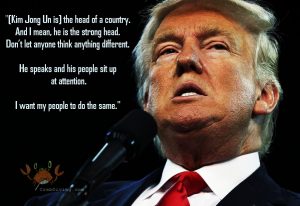
As for the Supreme Court, a moment of truth is approaching.
With three Trump appointees to the U.S. Supreme Court — Neil M. Gorsuch, Brett M. Kavanaugh, Amy Coney Barrett —it is possible that the court’s conservative majority will vote to shield a conservative president and accept his far-reaching claims of executive immunity. Such an outcome would further diminish the ability of the judicial branch to check executive powers and conduct.
These developments and strategies mirror what authoritarian leaders abroad have used to enlarge and entrench their powers. They almost invariably target the three key institutions that can hold them accountable as they move to consolidate power: independent courts, a free press, and civil society organizations.
These indicators are not irreversible, but they offer alarming signs of where the US may be headed. With the Republican Senate on a path of blind support for Trump and a Supreme Court that may accept his claim of absolute immunity from any kind of investigation, the legislative and judicial branches appear to be unable or unwilling to exercise their constitutional duty to check the presidency. And now, after three years in office, Trump seems even less restrained by the norms of presidential conduct that were guard rails for previous occupants of the White House.
According to Javier Corrales, writing in the New York Times, Trump is using the legal system like an autocrat.
Presidents across the world use diverse tactics to achieve unlimited government, but a common approach is to erode the impartiality of the law. The goal is always to use and abuse the law to protect yourself and your allies. This is called “autocratic legalism.”
The impeachment outcome and the Roger Stone and General Flynn scandals tell us that the process of creating autocratic legalism is already underway. The executive branch seems to have all that is needed to use, abuse and ignore the law to reward loyalists and perhaps even punish critics.
The president has been embracing the principle of impunity to loyalists since the 2016 campaign. At a famous violent rally that year, he told a crowd of supporters: “If you see somebody getting ready to throw a tomato, knock the crap out of ’em, would you? … I promise you, I will pay for the legal fees.”
This is the quintessential autocratic cry: “Support me, and both the law and I will be on your side”. The biggest winner from autocratic legalism was of course the president. A famous study found that none of the 45,000 court rulings between 2004 and 2013 successfully challenged the president’s authority.
Autocratic legalism is not easy to achieve in democracies, but it is not impossible. Trump is reminding us how it is done. First, the president needs the ruling party to serve as a legal shield. Check. Then you saturate the legal system with partisan judges. In progress. Next, you begin to interfere in sentences.
Trump has already demonstrated an affinity for legal pressuring. His recent tirade against Justices Sonia Sotomayor and Ruth Bader Ginsburg for being critical, demanding that they recuse themselves on all “Trump related matters,” betrays an impulse for turning the justice system into a support system.
The subsequent step in autocratic legalism is to use and abuse the law to target critics. This, too, is commonplace today among many countries with democratically elected presidents.
President Donald Trump is a most excessive person in anything he does or says. For example, he likes to take the so-called authoritarian “Mussolini pose”. He also likes to embark on totalitarian style “purges” of persons working for the United States government who do not heel to his commands, —persons he considers his “enemies”.

He surrounds himself with hard-core sycophants, lackeys and puppets, who are expected to give him a loyalty pledge, not a pledge to the U.S. Constitution or to the American people. Consequently, it is said that the U.S. under Trump is turning into a “banana republic.”
The current American president constantly attacks the freedom of the press, which is protected by the U.S. Constitution, calling journalists “enemies of the people” —an expression used in Nazi Germany. Donald Trump also shamelessly befriends other countries’ dictators and autocrats, while making fun of democratic leaders. And, to top it all, Trump has used in public the hubristic Nazi slogan of “God is on our side”, (‘Gott mit uns’).
As an authoritarian, Donald Trump is going further and further toward turning the USA into a one-man government, with himself a dictator-in-the-making, who openly yearns for unchecked, and if possible, absolute power. His plan, notwithstanding the U.S. constitution and its founding principles, is to transform the USA into a militaristic and neo-fascist state, with all the trappings, under his control, and with as few constraints as possible.
He is, by far, the most unprincipled and the most dangerous occupant of the White House that the United States ever had. He has no qualms in bulldozing American institutions if he feels such institutions are an impediment to him exercising full powers.
David Frum, writing in The Atlantic magazine, writes, “When early Americans wrote things like “Eternal vigilance is the price of liberty,” they did not do so to provide bromides for future bumper stickers. They lived in a world in which authoritarian rule was the norm, in which rulers habitually claimed the powers and assets of the state as their own personal property.” He goes on to argue: “If citizens learn that success in business or in public service depends on the favor of the president and his ruling clique, then it’s not only American politics that will change.
The economy will be corrupted too, and with it the larger culture. A culture that has accepted that graft is the norm, that rules don’t matter as much as relationships with those in power, and that people can be punished for speech and acts that remain theoretically legal—such a culture is not easily reoriented back to constitutionalism, freedom, and public integrity.”
Conclusions
George Orwell once said: “in a time of universal deceit, telling the truth is a revolutionary act.” If that phrase were a test, would you say that we — in fact you, yourself — are passing or failing it? Why don’t Americans seem to have any power over the authoritarian and fascist forces and tendencies in their midst? Why have those forces run amok, gleefully shattering institution after institution, norm after norm, to the point that concentration camps for infants have arisen in just two years — mere months — after the election of a demagogue?
More than any other political system, democracy—as Plato pointed out long ago—has the inherent ability to actualize its own demise. By manipulating the democratic process, elites can limit the freedoms of individuals or social groups and put in place authoritarian and autocratic leaders who are not democratically inclined. In a very concrete sense, democracy depends upon ordinary citizens’ capacities and motivations to absorb democratic values and tolerate those with diverse social, cultural, ethnic, and ideological backgrounds.
These are precisely the values that those on the right wing have been attacking for years, and they have exploited the inherent popularity of conservative ideology to do so. Social scientists have long known that highly threatening historical periods are accompanied by an increase in authoritarianism in the general population. Thus, following the terrorist attacks of September 11, 2001, there was a predictable uptick in support for authoritarian conservatism, as well as decreased commitment to tolerance and the protection of civil liberties.
Whatever the proximal psychological causes, we are bearing witness—all over the world—to the rebirth of extreme right-wing movements that thrive under conditions of anxiety. These movements promise a return to “traditional” (often religious) values, a curtailing of reproductive and other rights of women (as well as sexual minorities), and a revival of nationalistic (often ethnic) pride and the “restoration” of national boundaries, along with a dismantling of the “administrative” welfare state and the imposition of illiberal reforms and vindictive immigration policies.
Once in power, right-wing movements flirt with (and sometimes embrace) totalitarian practices, such as intimidating and even incarcerating protestors, journalists, academics, and any others whom they find potentially threatening or disruptive. With the support of conservative voters, illiberal governments have gained power in Hungary, Poland, Turkey, Brazil and many other countries. Radical right-wing parties are also resurgent in Germany, Austria, Switzerland, the Netherlands, France, and the United Kingdom.
Understanding mass psychology in this day and age, and the ways in which authoritarian politicians have so successfully tapped into it, is of paramount importance for understanding how this happened and how it can be fought; that is, for the long-term preservation of democratic systems.
To believe that America will retain its commitment to a vibrant democracy, and that any threats to it, including the authoritarian leadership of Donald Trump is only a temporary aberration, is wishful thinking and ignores the requirement that an informed and active citizenry represents all the citizens and protects democratic institutions. There’s an old story about how to boil a live frog so that it doesn’t notice you’re killing it slowly. You turn up the heat incrementally, but it is only aware of mild discomfort along the way and does nothing to save itself. And then it’s too late.
Copyright: Neither this article or a portion thereof may be reproduced in any print or media format without the express permission of the author.
Read my latest book: I Know Myself And Neither Do You: Why Charisma, Confidence and Pedigree Won’t Take You Where You Want To Go, available in paperback and ebook formats on Amazon and Barnes and Noble world-wide.


